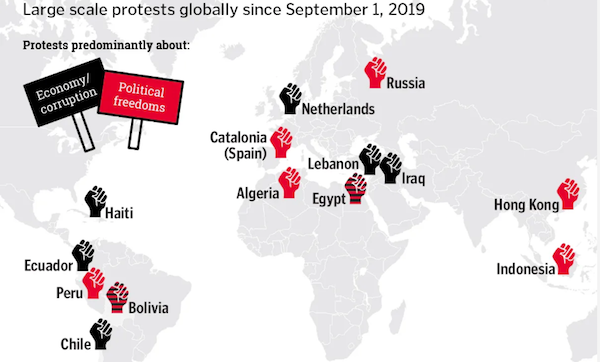The Daily Escape:

Lake Sabrina, CA – November 2019 photo by Wild_NDN
All of a sudden, there are ongoing protests throughout the world. This seems to be an enormous story, maybe the biggest story of October, despite America’s focus on impeachment. And there’s some, but not a lot of media coverage. Here’s a map of the locations, and primary causes, of recent unrest around the world:

When you see the map, it’s clear that something’s happening. In some places, protesters are mainly demanding more political freedom, like what we’ve seen in Hong Kong. In others, like Iraq and Lebanon, people are sick and tired of corruption and unemployment. They want to throw out the old guard.
The map shows 14 countries, but others report as many as 22 countries experiencing protests in 2019. Can we find common threads to these protests?
They don’t show ideological consistency, although they do show similar tactics. Unlike Occupy in the US, these protesters have demands, which vary with each protest. In some places, they involve millions of people. They do not seem to be internationally driven, although the local powers that be often say that they are.
A Chinese friend of the Wrongologist who lives in Hong Kong provides lots of coverage on local violence. For our media, violence is always “breaking out,” or protests always are “descending into” it, but we rarely hear deep explanations for why it occurs.
Let’s look at a few reasons that transcend individual countries:
Economic Slump
This argument is true for Chile, Ecuador, Venezuela and Haiti in Latin America. It is also true in Iraq in the Middle East. Despite their differences, each country saw commodity-driven economic growth, followed by a slump or stall. Haiti, despite its own economy largely being stagnant, saw billions in aid from oil-rich Venezuela come in, then disappear when Venezuela had its economic issues.
Income Inequality
Jeffrey Sachs frames income inequality as social unhappiness and distrust, in Why Rich Cities Rebel: (brackets by Wrongo)
“Three of the world’s more affluent cities have erupted in protests and unrest this year. Paris has faced waves of protests and rioting since November 2018…after…President Macron raised fuel taxes. Hong Kong has been in upheaval since March, after Chief Executive Carrie Lam proposed a law to allow extradition to the Chinese mainland. And Santiago [Chile] exploded in rioting this month after President Sebastian Piñera ordered an increase in metro [subway] prices….taken together, they tell a larger story of what can happen when a sense of unfairness combines with a widespread perception of low social mobility.”
Gallup finds that while Hong Kong ranks ninth globally in GDP per capita, it ranks 66th in terms of the public’s perception of personal freedom to choose a life course. The same is true in France (25th in GDP per capita, but 69th in freedom to choose) and in Chile (48th and 98th, respectively).
It appears that traditional economic measures of well-being are insufficient to gauge the public’s real sentiments. The protesters perceive the politics behind the prices, and that’s what they are moving against.
Income inequality also shows up as withdrawal or repricing of government services. From the NYT:
“In Chile, the spark was an increase in subway fares. In Lebanon, it was a tax on WhatsApp calls. The government of Saudi Arabia moved against hookah pipes. In India, it was about onions.”
In Ecuador, the focal point of the protests was a demand for restoration of fuel subsidies. From The Financial Times (paywalled):
“The mass protests that have broken out during the past year in Asia, Europe, Africa, Latin America and the Middle East…are usually leaderless rebellions, whose organization and principles are not set out in a little red book or thrashed out in party meetings, but instead emerge on social media.”
Social media is the enabler for leaderless movements. When the Hong Kong demonstrations broke out in June, Joshua Wong, the most high-profile democracy activist in the territory, was in jail. In Moscow, Russia arrested leader Alexander Navalny, but demonstrations continued without him. In Lebanon, France and Chile, authorities have searched in vain for ringleaders. In Iraq, Muqtada al-Sadr, has emerged as the leader of the movement to replace Prime Minister Mahdi.
Underneath it all, whether we’re talking about people wanting political freedom or economic security, these riots are about class, wealth, and income. They are about the fact that all of these countries have very rich people who make the rules.
And their rules never favor the non-rich.
It is unclear if any of these protests will effect change. History rarely favors the man in the street.
Pro tip: If you are going to riot, take the time to head over to the part of town where the rich live, and riot there.
